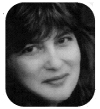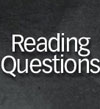Here on Earth

Announced on March 6, 1998
About the Book Learn more about the spellbinding tale that asks the age-old question: How do you survive a love that consumes?Book Review Read what critics thought of Here on Earth and share your own comments.
 Meet the Author With an undergraduate degree from Adelphi University and master's degree from Stanford, Alice Hoffman has made a life writing novels.
Meet the Author With an undergraduate degree from Adelphi University and master's degree from Stanford, Alice Hoffman has made a life writing novels.The Writer's House When the author's neighbor passed away, she brought his cottage back to life as a home for creativity.
 Reading Questions Use these questions to steer your book club toward a meaningful discussion of Here on Earth.
Reading Questions Use these questions to steer your book club toward a meaningful discussion of Here on Earth.Printable Discussion Questions

Black and Blue Read about the story Alice Hoffman has called "a national treasure," and meet the author of Black and Blue, Anna Quindlen.

In her most ambitious novel to date, Alice Hoffman delivers a spellbinding tale of love and obsession.
The remarkable fiction of Alice Hoffman has the power to work magic, and as Newsweek says, "The real spell is the one cast by Hoffman's splendid writing." Author of the best-selling novels Seventh Heaven, Turtle Moon and Practical Magic, Hoffman now creates her most glorious fictional world. The New Yorker has called Hoffman "a dreamy and mesmerizing storyteller," and never has she had a more seductive story to tell.Here on Earth is the dramatic and lyrical accounting of the joys of love, as well as the destruction love can release. The riveting themes of Wuthering Heights resonate beneath the surface, and a dangerous question is raised: Can a love that consumes you survive? Or perhaps more important, can anyone survive a love that consumes? Erotic, devastating, compelling, this is without a doubt Alice Hoffman's most unforgettable novel.
Form a reading group and use these discussion questions to help you through the text.

Alice Hoffman is the author of 11 other novels: Property Of, The Drowning Season, Angel Landing, White Horses, Fortune's Daughter, Illumination Night, At Risk, Seventh Heaven, Turtle Moon, Second Nature and Practical Magic. Born in New York City and raised on Long Island, Hoffman graduated from Adelphi University and received a master's degree from Stanford University, where she was a Mirrieless Fellow. She currently lives near Boston with her family and her dogs.
Read about the author of Here on Earth turned a neglected cottage into a haven for creative energy.
Read about the author of Here on Earth turned a neglected cottage into a haven for creative energy.

- In the beginning of Here on Earth, March remembers that, as a girl, "she believed that all you wanted, you would eventually receive, and that fate was a force that worked with, not against you." (p.7) What does March learn about fate as an adult? Do you believe that what happens to her is a matter of fate, or of something else? Do you find her a sympathetic character? Why, or why not?
- Many book reviewers have commented on the striking parallels between Here on Earth and Wuthering Heights; Alice Hoffman herself has called her novel her "homage to Emily Brontë." Why do you think the character Heathcliff resonates so strongly as a part of our culture? And why is he considered the archetype of the passionate hero, despite the latter part of Brontë's novel when he behaves vengefully and abusively?
- Compare and contrast the main characters and plot lines of both novels. How would Wuthering Heights have been a different story if Catherine had remained, like March in Here on Earth, a living presence throughout the novel? What would Catherine and Heathcliff's relationship have been like if Catherine had survived and they were able to live their relationship "here on earth?" Do you think Hollis is the essence of the romantic hero, or do you consider him a monster, the epitome of the satanic hero? Do you notice a difference in the answer to this question based on the ages of people in your reading group? How do our beliefs about the nature of true love change as we grow older?
- Alice Hoffman's novel portrays love "here on earth" as something very complicated and mysterious. Is it right to judge other people's relationships from the outside, since people's personal histories and emotions are, by their very nature, complex and subjective? What is it about the power of erotic love that makes it so uncomfortable for us to view from the outside? Do we tend to judge women more harshly than men for what we perceive as mistakes made under the influence of erotic love? If so, why?
- As the novel opens, March is concerned about Gwen and the choices she is making regarding boyfriends, drugs, schoolwork and lifestyle in general. Even though March remembers that "simple logic doesn't work" (p. 9) when it comes to reasoning with a 15-year-old girl, she is unable to influence her daughter's behavior. As the novel progresses, how does the relationship between March and Gwen shift? Does Gwen continue to want "the opposite of what her mother has"? (p.214– 215) Which of them is more effective in the role of "mother"? Do you think March and Gwen will be able to enjoy a healthy relationship at the novel's conclusion?
- Do you agree with Hollis that "the past can only hurt you if you let it"? (p. 29) Or do you believe, like March, that "unfinished business always comes back to haunt you?" (p. 123) In your opinion, is Hollis' behavior motivated primarily by love for March or by something else? If something else, what? What explains March's willingness to be controlled by Hollis? Do you have sympathy for him because of his traumatic background? Why, or why not?
-
as Richard been well served by his belief "in the topsy-turvy in life?" (p. 57) Do you think March appreciates this quality in him? Why or why not? At the end of the novel, do you believe Richard will accept March back into his life? Do you think she has changed enough through the course of the novel to be happy in a life with him?
-
Susie Justice is presented as a character who has had many relationships with men, but few long-lasting, meaningful ones. Do you think her parents' marriage and March's relationship with Hollis have affected her relationship and, if so, how? How would you evaluate the quality of her relationship with Ed? How is it different from the affair of March and Hollis? Do you think Susie and Ed will find happiness in the future?
-
In what ways does the author employ the desolate, New England setting to elaborate on her characters inner lives? What is the symbolism of the Marshes? Why is it significant that March and Gwen's "other life" is in California?
-
It is clear that Alan's life has been a terrible waste. In your opinion, is Hollis right when he tells Hank, "Your father got what he deserved?" (p.231) Or do you agree with Hank, who thinks, "No one gets what he deserves. ... Things happen, and sometimes it goes wrong. An entire life can become a dead end"? (p. 231–232) Does the novel's conclusion lead you to believe that Alan will be able to change his life? Why, or why not?
-
When Richard comes to Jenkintown to convice March to return home, Gwen realizes that "It's not the lie that's the problem; it's the distance the lie forges between you." (p. 183) What are the lies told by the major characters in the novel, and how do they each create the "distance" to which Gwen is referring? Which are more hurtful: the lies that are told or the truths that the characters leave unsaid? Can any relationship survive, in your opinion, when one person conceals the truth from another?
-
What enables Louise Justice to keep her knowledge of the Judge's love affair with Judith Dale a secret for 32 years? Would you have done the same in her position? Why does she choose the moment she does to communicate this knowledge to her husband? What do you think will happen to their marriage from this point forward?
-
Do you believe that one can love two people at the same time? What sacrifices does such an arrangement require? Did Bill Justice truly love both Louise and Judith, in your opinion? Why do you think he was unable to make a choice between them?
Why Turtle Moon, by Alice Hoffman, made a difference to best-selling author Jodi Picoult
More from Here on Earth

"Written with great wisdom and compassion, Here on Earth is Alice Hoffman's most powerful and moving novel to date and one of the finest fictional explorations of family love, and all those forces that threaten to undermine it..."
— The Washington Post Book World
"She turns the mundane happenings of life into lyrical prose."
— Chicago Sun-Times
"Alice Hoffman exhibits a way with words that can leave readers breathless and turn other writers green with envy."
— Denver Post
"Alice Hoffman's special genius is evoking extraordinary tales from ordinary places. Her small towns and suburbs are filled with magic both dangerous and healing."
— Rocky Mountain News
Read more selections from Oprah's Book Club.
— The Washington Post Book World
"She turns the mundane happenings of life into lyrical prose."
— Chicago Sun-Times
"Alice Hoffman exhibits a way with words that can leave readers breathless and turn other writers green with envy."
— Denver Post
"Alice Hoffman's special genius is evoking extraordinary tales from ordinary places. Her small towns and suburbs are filled with magic both dangerous and healing."
— Rocky Mountain News
Read more selections from Oprah's Book Club.



